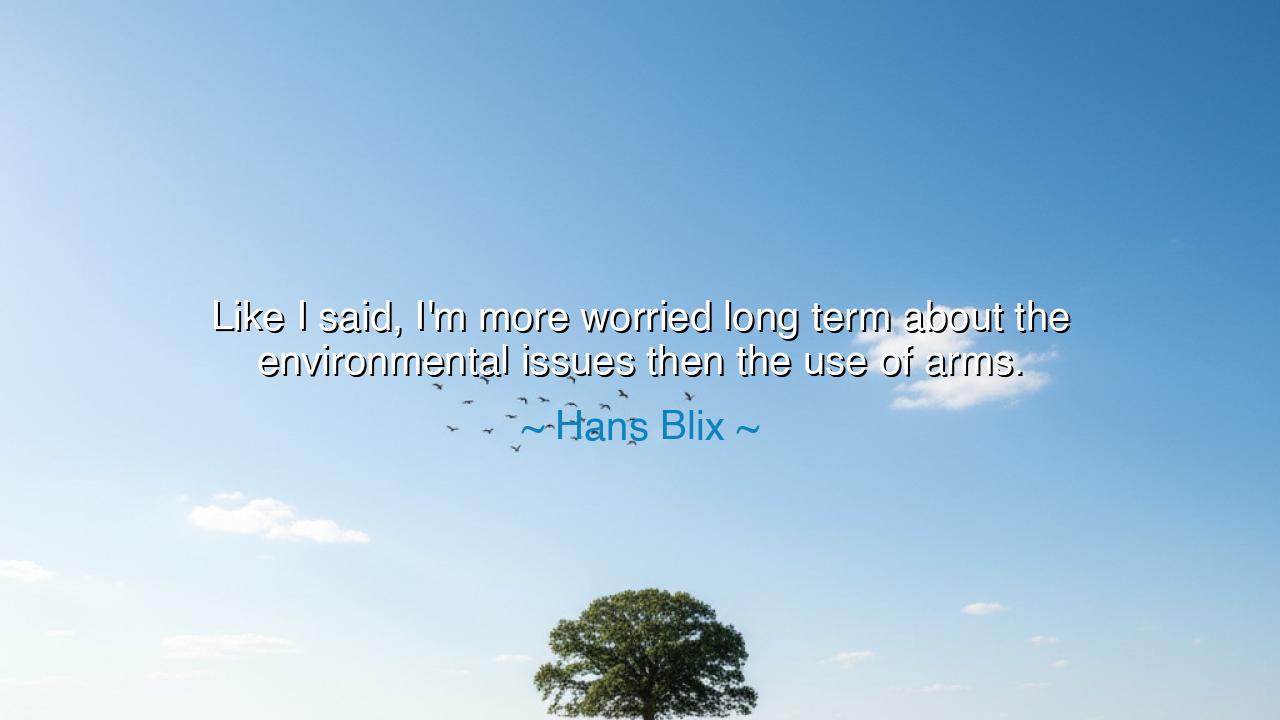
Like I said, I'm more worried long term about the environmental
Like I said, I'm more worried long term about the environmental issues then the use of arms.






Hans Blix, the calm yet steady voice of diplomacy in a turbulent age, once confessed with striking foresight: “Like I said, I’m more worried long term about the environmental issues than the use of arms.” These words, though spoken softly, resound like the warning of a prophet. For in them he reveals a truth that humanity too often forgets: that while the weapons of war may bring sudden destruction, it is the slow poison of environmental neglect that endangers all generations yet to come. His voice is not merely the judgment of a man, but the echo of wisdom carried across centuries of human folly.
The meaning of this saying is profound. Blix, who once stood at the very heart of debates on weapons of mass destruction, knew the horror that war could unleash. Yet he discerned that beyond the battlefield lies a deeper and more enduring peril. Arms may kill thousands in an instant, but environmental issues—climate change, pollution, deforestation, the poisoning of seas—threaten billions silently, gradually, and irreversibly. His words remind us that true danger is not always swift and visible, but often patient, creeping, and relentless, eroding the very foundations of life.
The origin of this reflection lies in Blix’s long career as a diplomat and inspector. He spent years navigating the tense world of nuclear weapons and international conflict, yet even from that position, he turned his gaze toward the earth itself. He understood that nations may lay down their weapons after war, but no nation can lay down a ruined climate or poisoned rivers. His wisdom was forged in the crucible of war and peace, yet his conclusion pointed beyond politics: that the fate of humanity rests upon its care for the earth.
History bears witness to this truth. Consider the catastrophe of the Aral Sea, once one of the largest lakes in the world, now reduced to dust by reckless irrigation policies. No bombs fell there, no armies clashed, yet the devastation was as complete as war: villages abandoned, livelihoods destroyed, and entire ecosystems erased. The tale of the Aral Sea stands as a grim monument to Blix’s warning—that the tools of destruction are not only arms, but also the careless hands of men who exploit without foresight.
There is something deeply emotional in Blix’s words, for they touch the soul’s hidden fear: that our downfall may not come with a roar, but with a sigh—the slow unraveling of forests, the melting of glaciers, the silent vanishing of species. Unlike the drama of war, these losses often pass unseen, yet their weight upon the human spirit is heavy. His words invite us to see beyond the battles of nations and to recognize the greater battlefield upon which all humanity stands: the battlefield of survival against its own neglect.
To future generations, Blix’s voice offers both warning and hope. The warning is that if humanity continues to prioritize arms and conflict over sustainability, it will win wars but lose the earth. The hope is that unlike weapons, environmental issues are within our power to resolve—not by force, but by wisdom, restraint, and cooperation. He calls us to courage, not the courage of the soldier alone, but the courage of the steward, who sacrifices comfort for the sake of preservation.
The lesson is clear: turn your eyes from short-term battles to the long horizon. Do not be deceived by the noise of war alone, but listen also for the quieter cries of the earth. Practically, this means living with restraint, supporting policies that defend the environment, and holding leaders accountable not only for security of borders but for the security of rivers, forests, and skies. For the shield against war may save a people, but the shield against environmental collapse will save the species.
Thus Hans Blix’s words endure: “I’m more worried long term about the environmental issues than the use of arms.” Let us take them not as mere opinion, but as counsel from one who has seen both war and peace, and who dares to say that the greatest enemy is not one nation against another, but mankind against its own future. Let us remember: weapons may fall silent, but the earth never ceases to speak, and if we do not heed her voice, our silence will be eternal.






AAdministratorAdministrator
Welcome, honored guests. Please leave a comment, we will respond soon